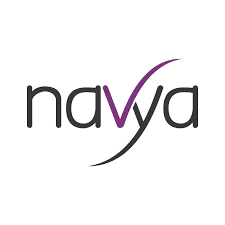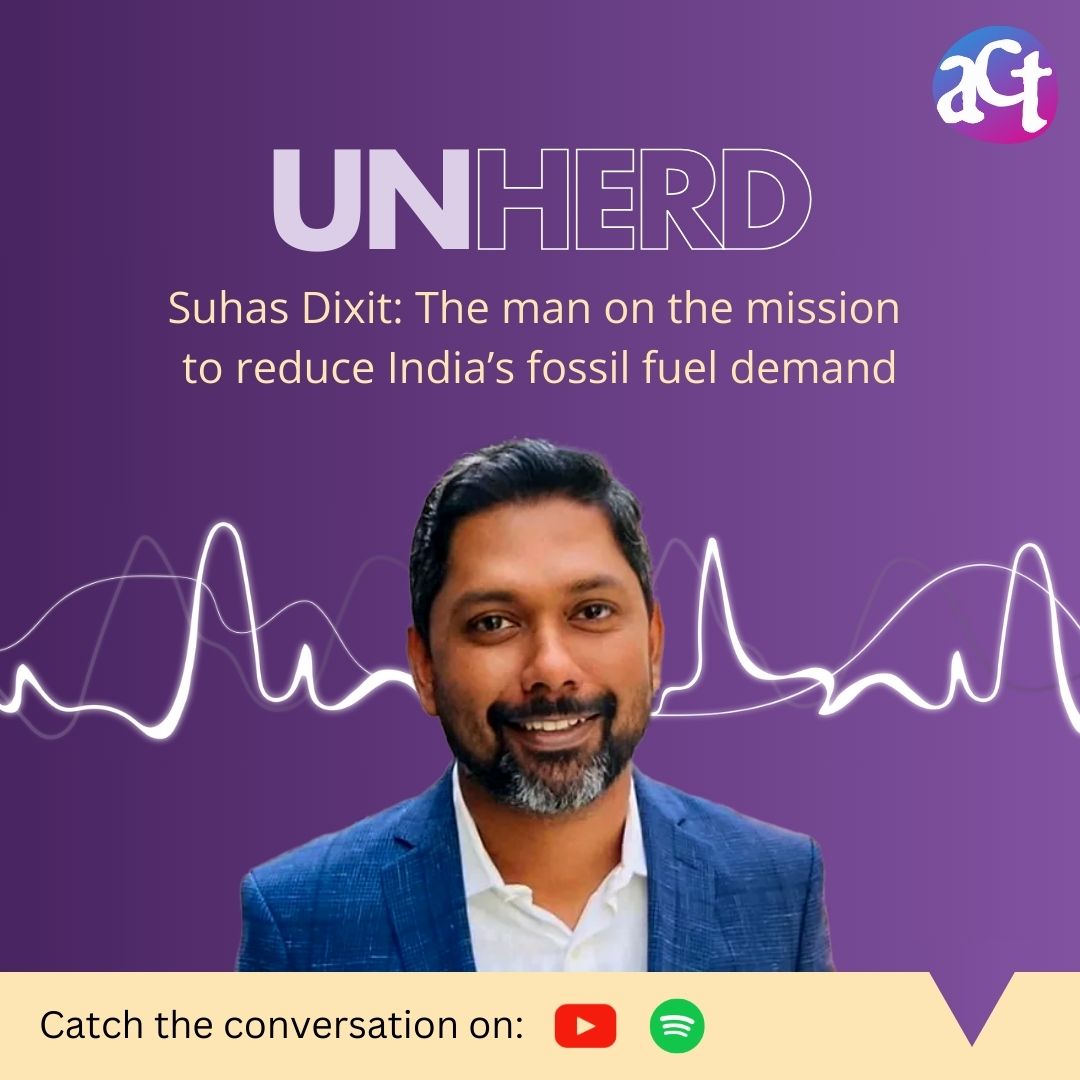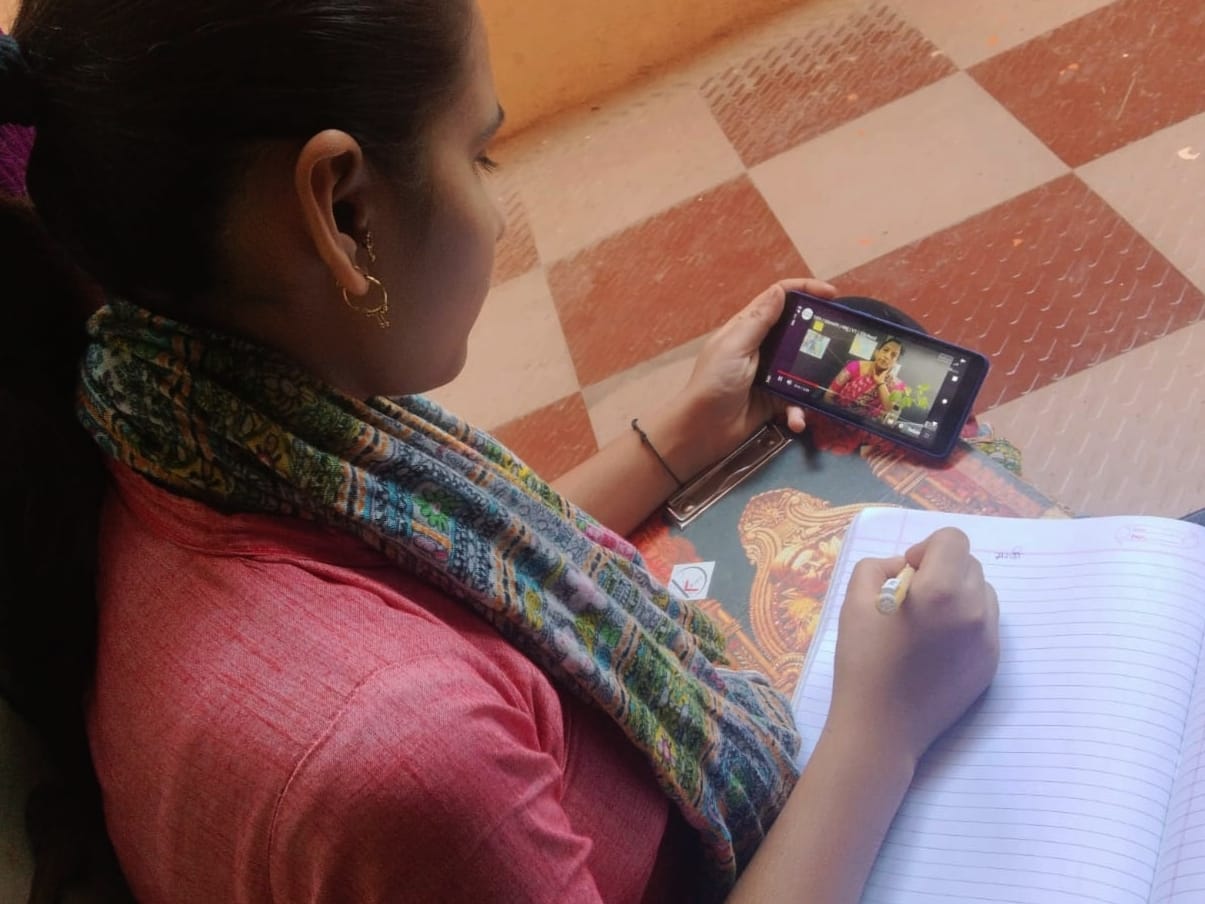Hosted by ACT, UnHerd brings you the unheard stories of individuals who are challenging conventional principles to disrupt the social impact landscape. From social entrepreneurs to venture philanthropists, dive into real-world conversations on what they’ve experienced and learned about changing the status quo.
Our first episode welcomed Suhas Dixit (Founder, APChemi) who is pioneering a cutting-edge pyrolysis technology that is enabling plastic circularity. In conversation with Alankrita Khera (Director, ACT), Suhas delves into his inspiration for building APChemi and his insights on the cleantech industry, the tough lessons he has garnered along the way as well as his perspective for other entrepreneurs building in this space.
Listen to this episode on our Spotify channel or watch the conversation on YouTube.
Alankrita – Hello and welcome to the very first episode of UnHerd – a podcast hosted by ACT that delves into the extraordinary stories of individuals who are challenging conventional principles to disrupt India’s social impact landscape.
When we think of environmental concerns, plastic waste management is always top of mind. India generates an estimated 3.4 million tons of plastic waste annually, out of which only 30% gets recycled. The remainder is essentially non-recyclable and either ends up in landfills for incineration or is dumped in aquatic bodies – contributing to carbon emissions and severely impacting local ecologies.
Our guest today is the founder of APChemi – a chemist turned social entrepreneur who decided to address this gap by pioneering an advanced pyrolysis technology that truly enables plastic circularity. APChemi is breaking barriers associated with traditional recycling by converting non-recyclable plastic waste into a purified oil which can be used to produce sustainable chemicals and even aviation fuel. Having partnered with corporates and municipal corporations alike, the solution has the potential to also offset the demand for fossil fuels in the long term!
Welcome to UnHerd, Suhas!
Suhas – Thank you so much, Alankrita.
The spark that lit the fire: APChemi’s origin story
Alankrita – Really glad to have you. You’re a chemistry major who could have worked in any global corporation of your choice, but your obsession with plastic waste led you to become an entrepreneur and start APChemi. What’s the story there?
Suhas – A lot of early motivations shape what you do tomorrow. Back when I was a kid, children around me used to burn plastics and I was raised in an interior village in Maharashtra, so these kinds of things used to happen. Now I know that burning plastic waste is incineration and that it creates a lot of harm, but back then it was my first introduction to plastic – subjecting it to heat. After that, during my graduation (at ICT), it so happened that we had some kind of a glassware assembly arranged. And I thought, “Okay, now that the professor has not turned up, what if I put plastic into the reactor and see what comes out from the condenser?” Those were the early experiments. It’s not like you have an idea – the idea has you.
Alankrita – Yeah. And I remember this really interesting story from one of our earlier conversations where you had essentially created a small plant and you had demonstrated it by putting it into the back of your car. Would love to hear a little bit more about that. What was that initial hustle?
Suhas – Yeah, after my MBA, I worked for corporates in marketing and strategy, which the sales team would implement. I held such corporate jobs until 2007, but it didn’t give me satisfaction. I wanted to do something involving converting plastic into oil. Those few experiments I conducted during graduation motivated me to pursue that. So I quit my stable job, used all of my savings to set up a small pyrolysis plant to convert maybe 1-2 kgs of plastic into oil. Then I started showcasing those plants. You get a free stall at city council exhibitions because hardly anybody wants to go there and exhibit. So early-stage entrepreneurs who don’t know what they are doing can easily get a stall there. I began displaying it there, thinking that if I display my solution at an exhibition of a municipal corporation, I’ll get a contract from them – not knowing at all what government contracting entails. But once you put your idea out in the world, people who like your idea start talking to you, and that leads to something. Around 2018, a lot of legislation started around the circularity of plastics. That led us to understand that just converting plastic into oil is not enough. The oil needs to have good enough quality. That’s where the industry started moving once the legislation supported the advanced chemical recycling of plastic waste.
Traversing tough roads: The anatomy of a resilient entrepreneur
Alankrita: Yeah, I mean, the market has definitely changed quite a lot. But when I think of founders, and especially founders in the clean tech space, actually founders anywhere, really, it’s all about failing fast, learning fast, pivoting fast. What are the lessons that have enabled you to build faster, better, stronger with APChemi today?
Suhas: The way I look at entrepreneurship is that it’s your decision to solve problems that have not been addressed.The moment you venture into it, there are bound to be failures. And then once the mistakes come, what can make a lot of difference is how quickly you get over it, just solve it and create a larger value. So that the failure that you encounter doesn’t mean much in the overall turn of events.
This happened to me somewhere around 2011 – 2014, when I had a stable reactor design and a process plan design where we knew that what we had promised would get delivered. During that time, I came across a gentleman who had served at a very high level as a senior process engineer and was the Director of a global organisation. He proposed the design of a reactor which would work better than my existing reactor design. And I got influenced by somebody else’s idea thinking that just because that person is experienced, his design could work better than my proven ideas. I adopted that design in a project that had nothing to do with him, of course with his consent. The whole thing did not work out. So that’s where I learned a lesson that don’t get infatuated if somebody comes across as very intimidating. Just be grounded – you know your technology, you know what you’re doing, so just stick to that and don’t take sudden decisions as such. (Initially), our focus was more on selling systems that work. But with APChemi, Agile Process Chemicals, our focus is more on building collaborations that sustain.
Alankrita – It’s interesting how you’ve woven that into your company name as well; it was such a big lesson at that point of time. There’s always this one big driver that propels this journey forward, right? So for you, Suhas, in the larger context of India’s climate goals, what is that catalytic role that you, as a social entrepreneur, see yourself playing?
Suhas – We, as an organisation, believe that we can divert 500 kilotons per annum of plastic waste away from landfilling and incineration by 2030. We are setting up an oil purification plant of our own, the first of its kind plant in India, to upgrade the pyrolysis oil to the requirements of a petrochemical buyer. And then, also, we want to licence this technology so that India doesn’t have to depend on crude oil.
Alankrita – It’s almost like playing a role in the larger decarbonization movement.
First principles lens: Addressing self-doubt and business risks
Alankrita – I do actually want to, at this juncture of the conversation, share a snapshot of APChemi’s trajectory so far. I mean, the solution has recycled 179 million kgs of non-recyclable plastic waste into pyrolysis oil with the goal of reaching 1 billion in the next two years. It has created over 3000 jobs with 47 projects, has five granted patents with 12 more in the pipeline, and successful partnerships with folks like Shell KIIT, TBI, and the Indo Danish Hydrogen Call, and more.
Your conviction to build and grow in this space seems to have moved mountains, but there must have been seeds of doubt along the way, right? What have been some of the “Am I doing the right thing” sort of moments that you’ve encountered, which really made you feel like, “I need to second-think this”?
Suhas – I mean, nobody can really escape self-doubt, right? At some point in time, you start questioning whether you deserve this, or whether you’re smart enough to handle the situation, or whether you’re capable enough or not. I mentioned that I had tried to adopt somebody else’s design and the project kind of failed. When this happened, I went to an advisor of mine – a very senior chemical engineer who has a lot of experience and has received one of the highest awards from the government of India. I told him -”This is a liability that has been created because the reactor design that I tried but didn’t work. And then, to solve this problem, I have this much money in my hand – where do I go from here? I have all kinds of self-doubt, and I’ve just come here to find a solution from you.” So what he did was very surprising to me. He made me take an IQ test and at the end of it, I asked him why he made me do that. His principle or theory is that if someone’s IQ is more than 110, then that person should get into the business of solving problems. And if it is less than 110, then one should get into the business of managing the problem rather than solving; one can hire people to solve the problem. Since my IQ somehow turned out to be more than 110, he gave me a kind of confidence that I could solve the problem. I mean, he just handled me in the lowest of my moments. Probably, he has seen more rainy seasons than me. So, he understood that just handling this moment of low is more important than just giving this guy a solution.
But I mean, going back to your question, how do you overcome your self-doubt? Probably only by perseverance.
Alankrita – What have been some of the bigger risks, if I may call it that?
Suhas – So when crude oil prices crashed in 2014, the market for converting plastic to oil kind of got wiped off overnight. Crude oil prices were $120 per barrel and that got slashed down to $30 per barrel. And pyrolysis oil that was getting sold at around Rs. 60-80 per litre; the prices of it got crushed to Rs. 20-30, because of which the whole market changed. It was a huge shuffle. All your relationships changed, all your projects changed, your projects got cancelled and suddenly your team of 80 engineers didn’t have any work to do. So, I was in a situation that I had never faced before. For almost one and a half years, I carried that heavy load of those engineers as I exhausted all my financial resources, went to zero, lost everything that I had, just to pay salaries of a heavy team, hoping that the market will turn around. The lesson that I learned is that you have got to do something in this situation. Just because you have money, you cannot keep it burning. You cannot carry a heavy load by not working on the problem. So, the highest risk that I took probably was to learn the lesson that was required to be learned, I guess.
Future Forward: Emerging opportunities for cleantech
Alankrita – I mean, that’s the thing. From an external lens, a clean-tech founder’s life just sounds exciting. You’re building new technologies, you’re charting new growth paths for the company, you’re being recognised as an innovator, as a disruptor. But we know that’s not the whole picture, especially for early-stage companies. There are struggles that are not always actually visible to everybody on the outside. What have been those for you in the current context?
Suhas – So if you look at the current plastic scenario, recycling plastic begins with segregation of plastic waste. However, let’s face the reality: less than 15% of plastic waste undergoes segregation. Moreover, only water bottles and PET bottles are frequently segregated due to their ease of handling and higher market value. On the contrary, flexible plastics like chips packets often remain uncollected, leading them straight to landfills, incineration in cement plants, or burning in waste-to-energy plants.
If you look at the value chain, consumers generally disregard the segregation of plastic waste. Once collected, plastic waste is handed over to the municipal corporation, which, in turn, prioritises disposing of plastic waste rather than recycling it. Municipalities often delegate the entire waste management contract to municipal solid waste contractors, who, in turn, prioritise collaboration with municipal corporations over achieving recycling targets.
Material recovery facilities, which are crucial in the recycling process, face operational challenges. Their predominant mindset favours burning flexible waste rather than engaging with chemical recycling or pyrolysis companies, which demand high-quality plastic waste. Additionally, petrochemical companies exhibit reluctance towards pyrolysis plants due to their size differences and operational complexities. Like a petrochemical company would be a $1Bn asset – they are not very open to hundreds of pyrolysis plants.
And then there is a disconnect between polymer producers and FMCG companies, where the relationship tends to be more commercial. How cheap can you give me rather than asking what is the recycled content in your polymer, or can you give me recycled polymers? That discussion is yet to start because legislation doesn’t demand it. Consequently, the plastic circularity value chain, involving consumers, municipal corporations, recyclers, polymer producers, and FMCG players, lacks a unified platform or legislative framework to facilitate collaborative efforts and innovation.
Alankrita – EPR in various countries, including India, essentially mandates producers and brands for accountability for post-consumer waste. Is that having any positive connotations for what you’re trying to do with APChemi, is that enough to be able to drive this in the right direction?
Suhas – You see, some amount of responsibility is always better than zero responsibility. So, what EPR does is assigns responsibility to brand owners, FMCGs, and packaging companies. But there are two, three dimensions here. First of all, concerning EPR, who should be made liable? Should it be only FMCGs, brand owners, and packaging companies, or should polymer producers also be involved? Right now, the EPR framework doesn’t include polymer producers. For polymer producers, there is no compulsion to consider the extended producer responsibility of producing the polymers. So, there is a disconnect there. The management of plastic waste has a significant carbon footprint. What EPR does is enforce the management of plastic waste, which is good. But EPR should go beyond managing plastic waste and also consider the carbon footprint of managing the plastic waste.
Alankrita – So, almost like a plastic tax, I don’t know if I may call that that.
Suhas – Plastic tax would probably be a tipping point for seriousness around plastic waste management. So the difference between legislation and legislation on tax is that if you don’t follow a government guideline on EPR, you’re doing something wrong but there are no serious consequences. But if you have something like a plastic tax and if you don’t follow the legislation around plastic tax, then evading taxes is a very serious situation. So it kind of puts everybody on the spot. But then again, that plastic tax – who all does it affect? Plastic tax would do much better than EPR but then covering the entire value chain is more important than just having these legislations.
Founders’ perspective: Finding purpose and product market fit
Alankrita – It’s really hard to not look at one without looking at another. Interestingly enough, I recently read somewhere that even though Asia is like the centre of the plastic waste crisis in a lot of ways, yet 95% of investments to solve these plastic problems are actually happening in the US and Europe and we know clean energy is a huge opportunity. But I think also the biggest challenge for climate tech startups is often to secure enough funding to overcome that period between creating a minimum viable product to reach product-market fit. In that context, what are some of the big things you have learned along the way?
Suhas – The amount of funds available for these kinds of initiatives and the overall availability of funds to small and medium enterprises, are very low in India.The only access to capital that entrepreneurs in India have is this funding scheme called CGTMSE. Other than that, there’s not much access to capital that small and medium entrepreneurs have compared to those in developed countries. So if you set up a business in Singapore, it’s very easy to get substantial tranches in three stages – one to develop the technology, second to scale it up, and third to commercialise. The government is betting half a million dollars on entrepreneurs who are serious about what they want to do in all of these developed countries. Compared to that, capital available in India is a challenge for small and medium enterprises. When I attended those municipal corporate exhibitions and displayed my technology there as a very young entrepreneur way back in 2007-2008, I very quickly realised that dreaming about a million-dollar contract needs to stop. What is more important than raising funds is having cash flow. So, as long as you have cash flow, wherever you are in the world, you will sail through.
Alankrita – Yeah. I was also hearing you talk about one of your mentors and it almost feels like the presence of the right mentors, the right advisors, is also fairly critical.
Suhas – Of course. Not only do they bring in a very independent perspective, but they also encourage and that plays a very important role for entrepreneurs. I tried to build something without advisors and it felt like a lot of struggle. It’s not necessary that you have to struggle so much. Of course you have to put in effort. Effort and struggle are different things. So, effort doesn’t get reduced but the struggle gets reduced for sure in case you have great advisors.
Alankrita – We know that cracking PMF with a B2B solution in the sustainability space is actually quite tricky. In your experience, the journey that you have traversed with APChemi so far, what is the right approach, if you can even call it that, for clean tech founders to adopt?
Suhas – In the market, you’re going to come across ten different customers or a 100 different customers. You cannot say that each of these customers has the exact same requirement and I will serve them with this technology or solution only and the entire strategy for product-market fit will work like this. So, it really helps to talk to them. And also, not only the entrepreneur talking to them, but also training your team on how to interview the customers, understand where they come from, what their priorities are, what their worries are, what they are looking for to go to the next step. There’s no substitute for it. You need to understand that every customer is going to be different, and the customer dictates the product-market fit rather than you dictating the product-market fit.
Alankrita – So, customer centricity is extremely key. I want to come back to your big purpose. You articulated that a little while ago and you talked about decarbonisation. And look, that’s not a revenue goal. That’s not a valuation goal. That’s an environmental goal. For social entrepreneurs, I feel like it’s so imperative to focus on both purpose and profit. How do you balance business sustainability with climate impact?
Suhas – So profit can also be one of the purposes and a lot of entrepreneurs work on that idea that as long as I’m making profit, that is a good purpose to have and all will be good but very soon and hopefully sooner than than later, there is some emptiness that comes into the business. It becomes very artificial and you don’t really solve real problems and all.
I learned this from my grandfather. I asked my grandfather for advice on the business one day. And he asked me, “What do you call finance in Marathi?” I didn’t know. He said, “Go and ask.” My mother told me that it’s called Artha Shashtra. Yeah, I think that makes sense. So I went back to him and then he made me understand the meaning of that word – that there is Artha and then there is Shastra. So Artha is meaning and then Shastra is Science, So the science of meaning is Artha Shastra – the way we think about business or profitability in our part of the world. As long as meaning is there, money will be a by-product of it, profitability will be a by-product of it.
Alankrita – In fact, I remember in one of our conversations I have heard you say that purpose takes you far, much further than things like market valuations etc. And that to me was actually a very powerful statement. What are some of those fundamental shifts that founders, who are building in the space, need to keep a very close watch on? So that they can help India accelerate its progress towards the climate action objectives?
Suhas – So that’s a very interesting question. If entrepreneurs indulge in doing something that is not aligned internally and externally, there will be a lot of disappointment regardless of whether the market has challenges or not. Once you have that base, then what probably you want to do as early as possible is get advisors. Having somebody else challenge your ideas in a friendly manner is extremely valuable, especially earlier on, so as to prevent blunders.
Then the market is going to be a mix of opportunities and challenges. If you focus more on challenges, you will experience more of that. But find out where the opportunities are and focus on that and also try to match the size of opportunity with the size of expenditure that you have to incur to keep the business alive. Go for smaller opportunities as well. So, if you’re an entrepreneur and probably if nobody knows about you, you want to ensure that you have an invoice ready for the smallest size to a larger size, so that when you come across a market, or a problem in a market where somebody can pay for your goods or services or expertise, you have that to offer.
Alankrita – This has been absolutely incredible.Thank you so much for joining us for this conversation today!
Suhas – Thanks Alankrita, thank you so much.
Alankrita – This brings us to the end of our first episode of UnHerd – a podcast presented by team ACT. If you enjoyed this episode, subscribe to our Spotify and YouTube channels where we’ll bring you more unheard stories of people who are passionate about creating impact at scale in differential ways. People who truly stand apart from the herd.




